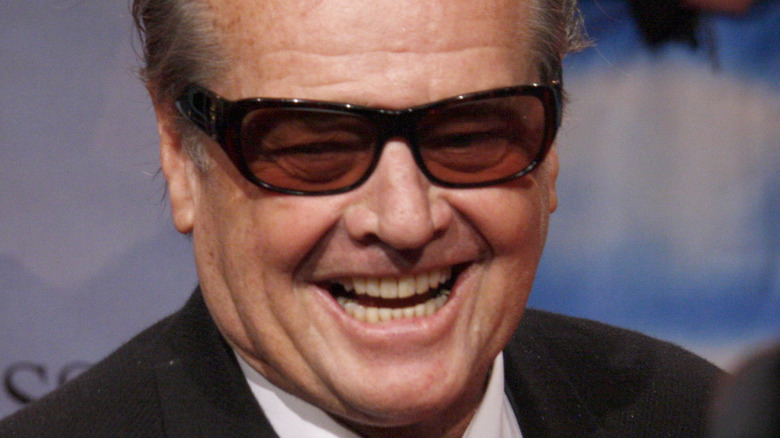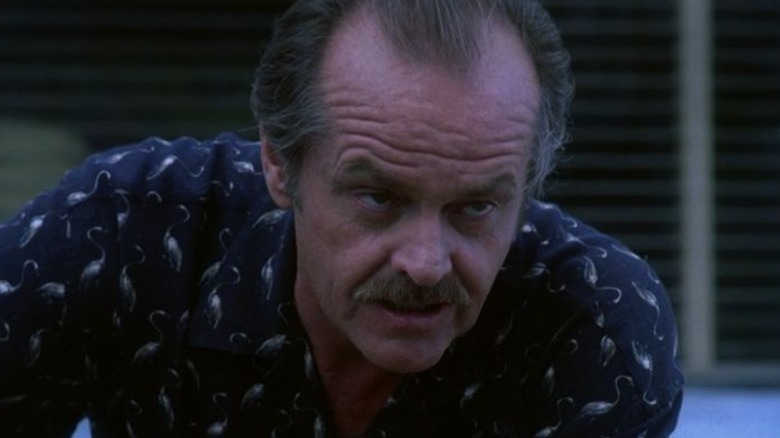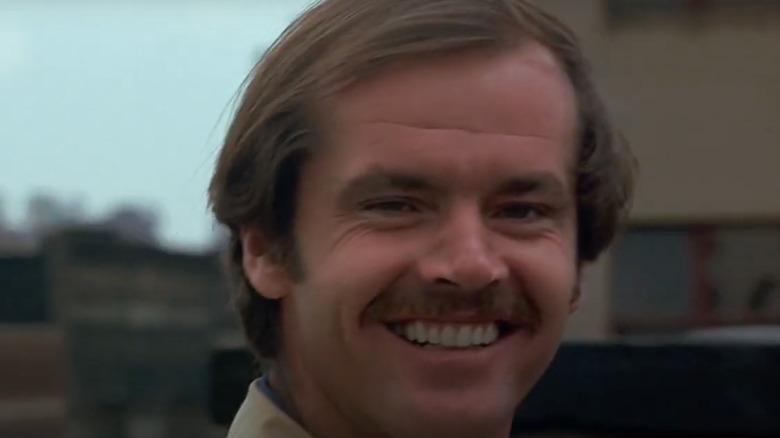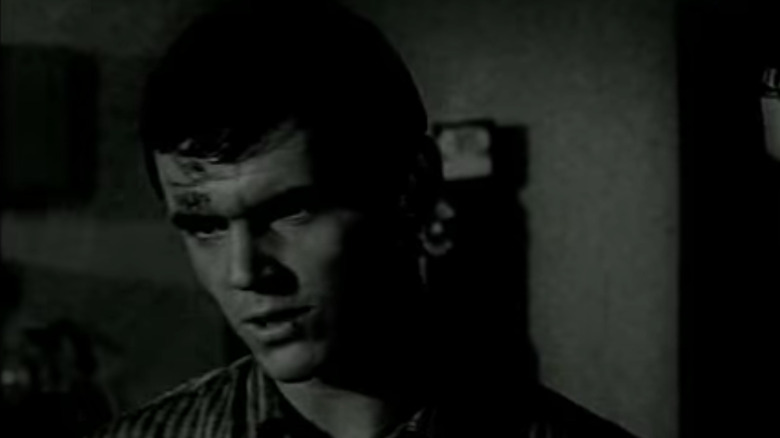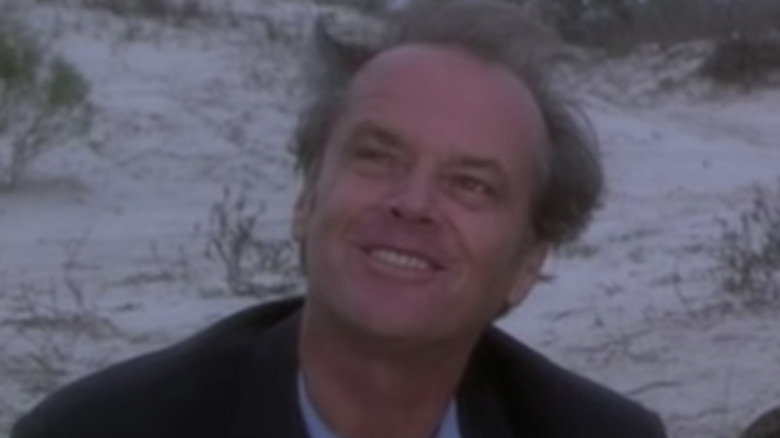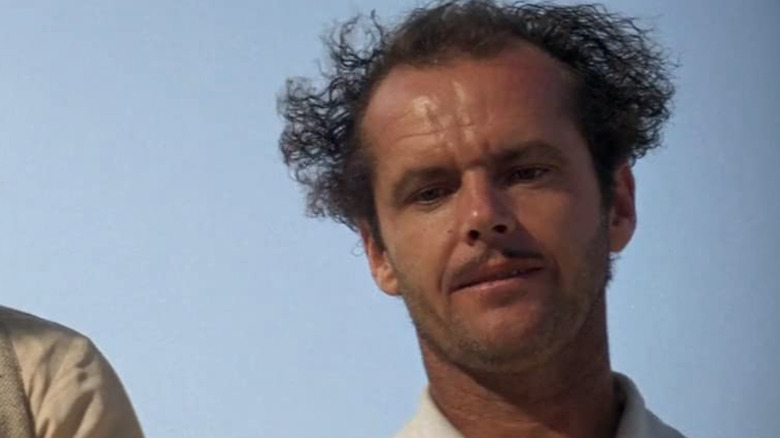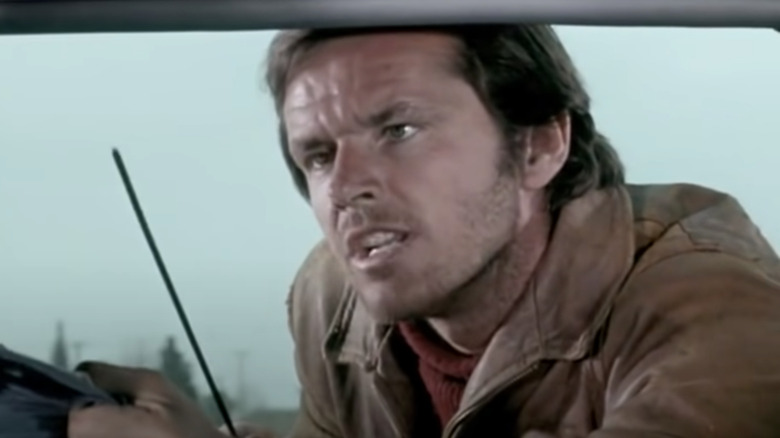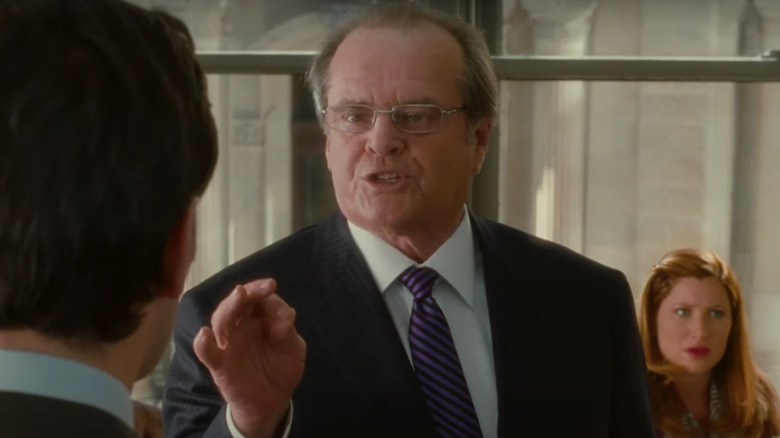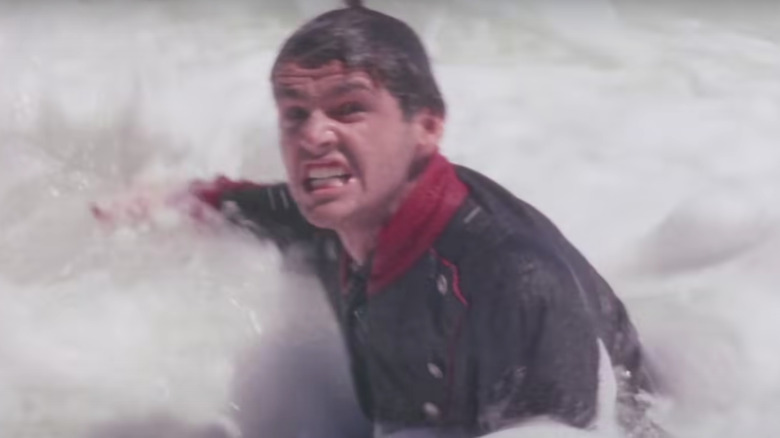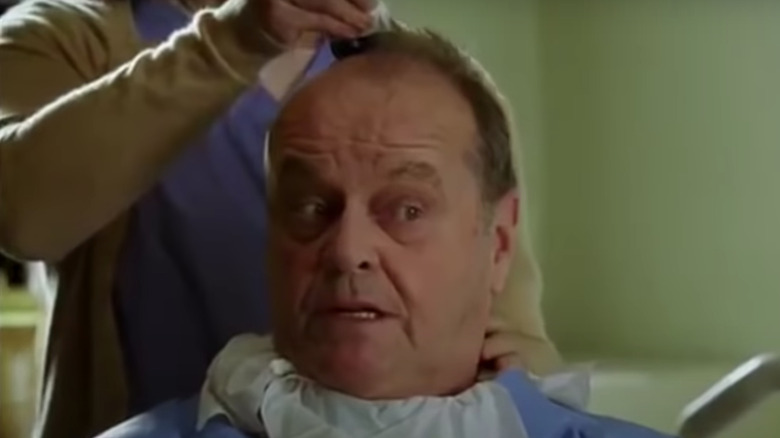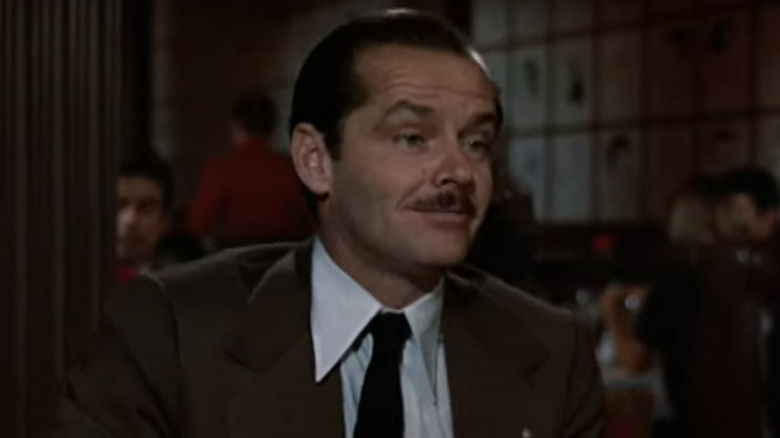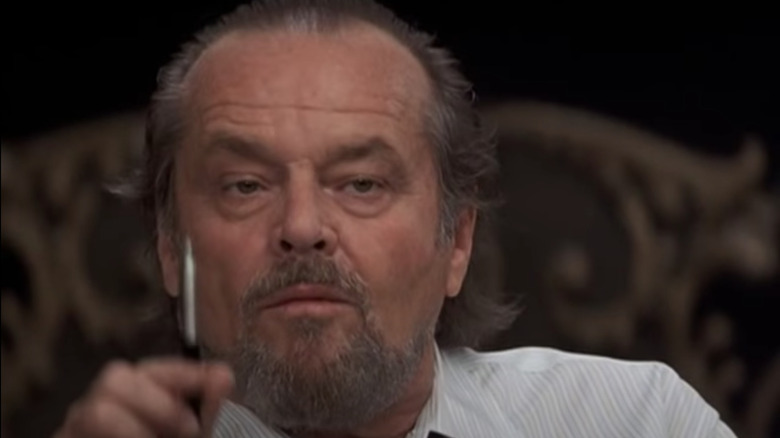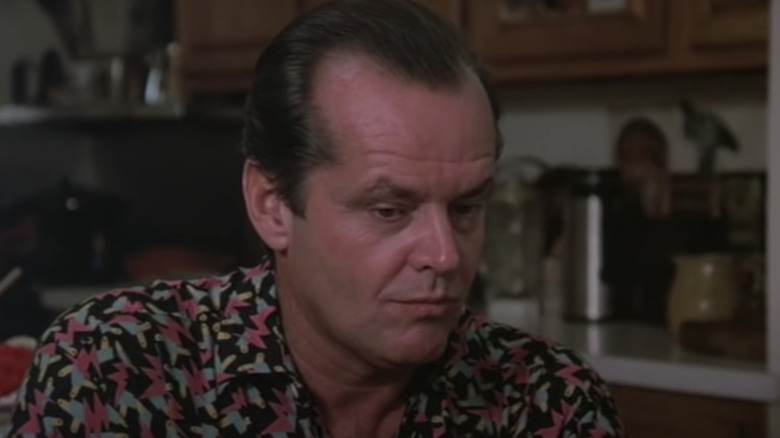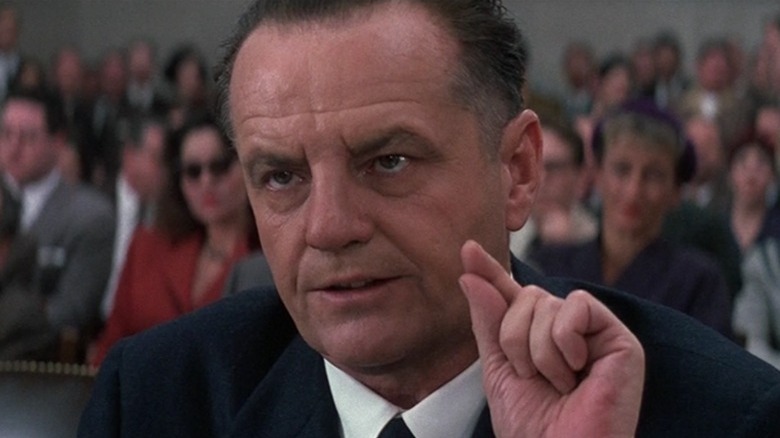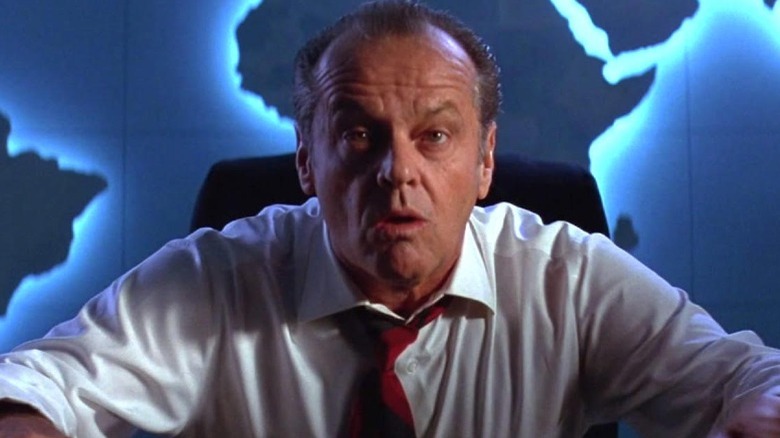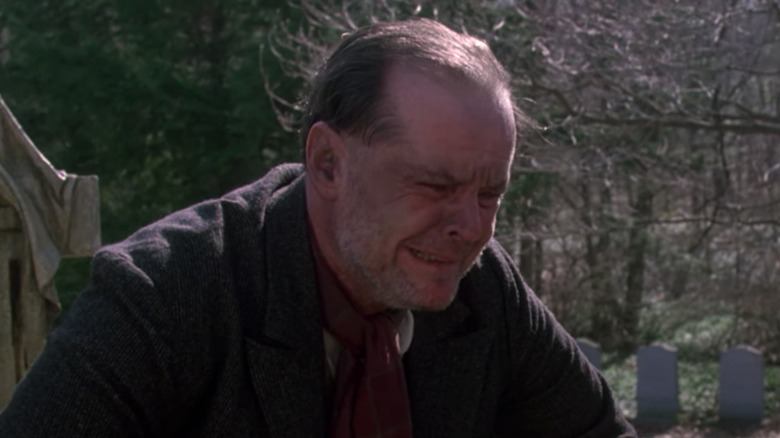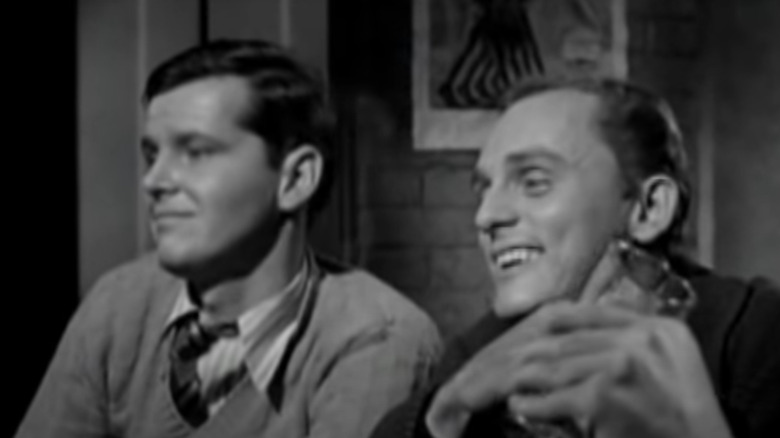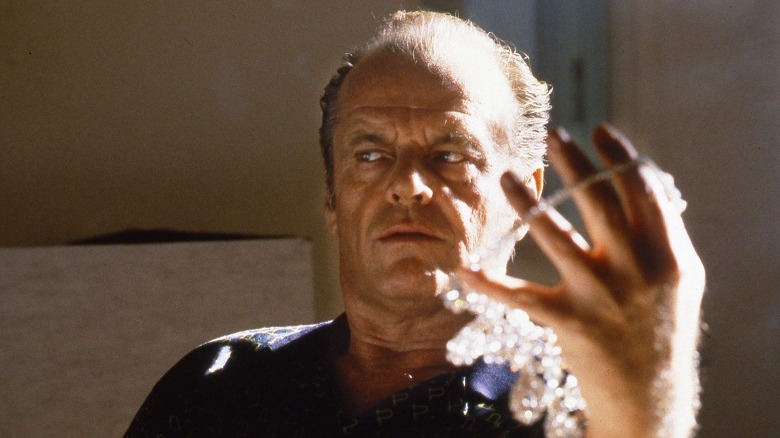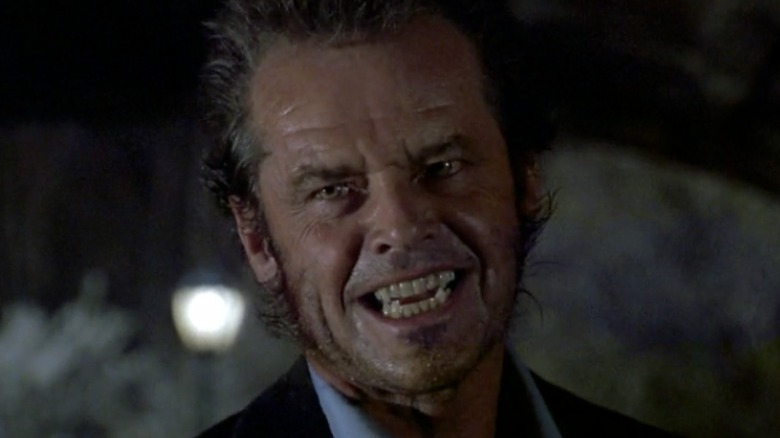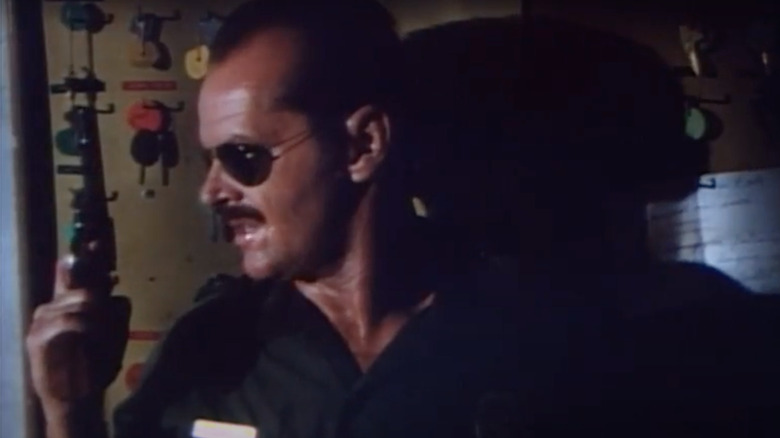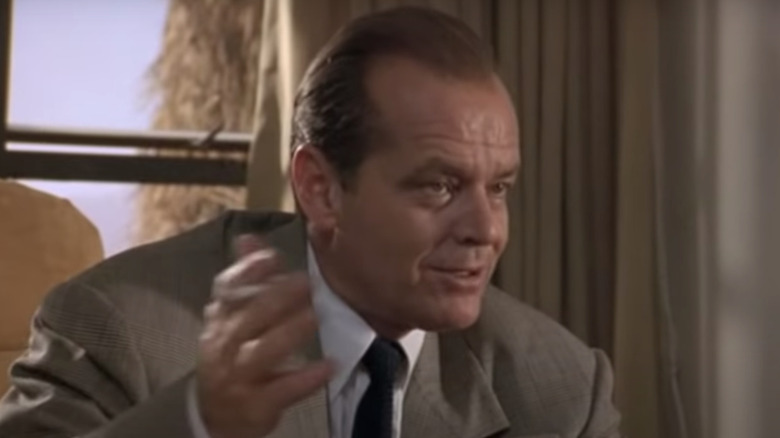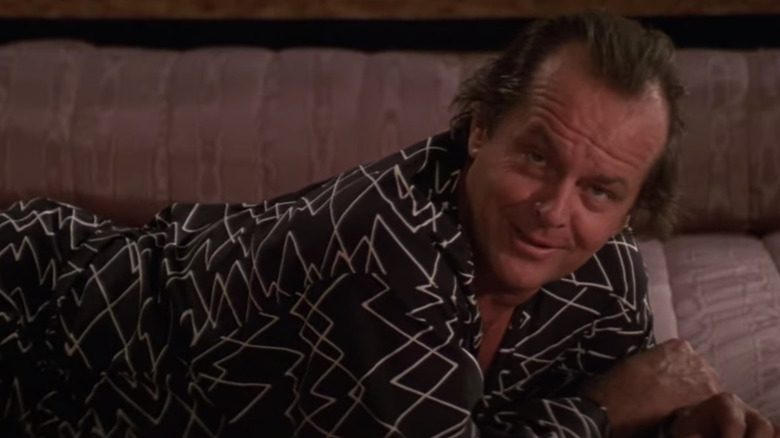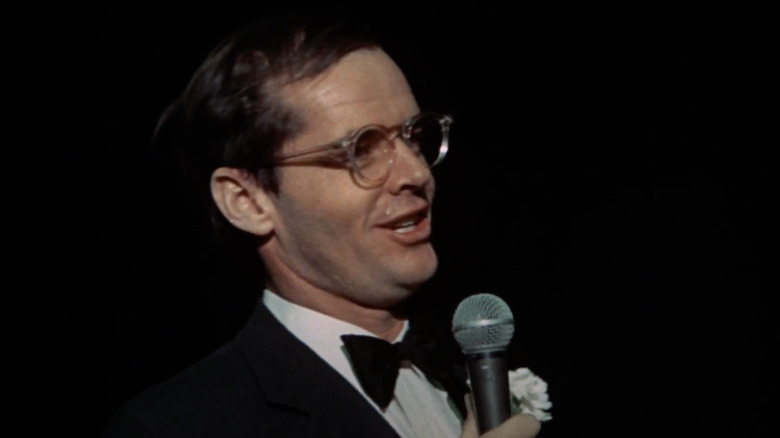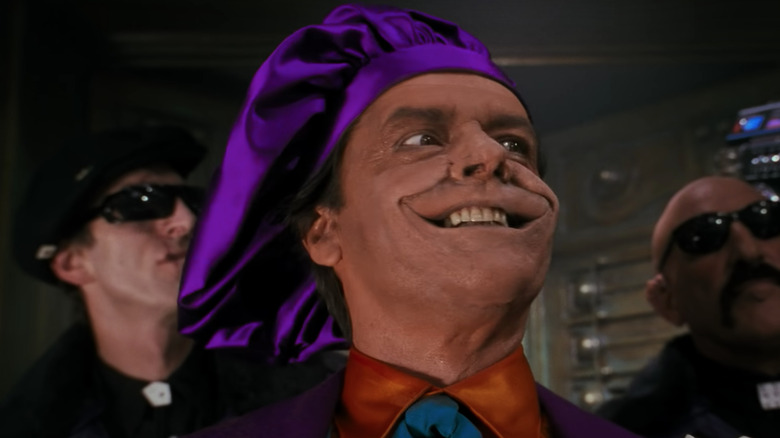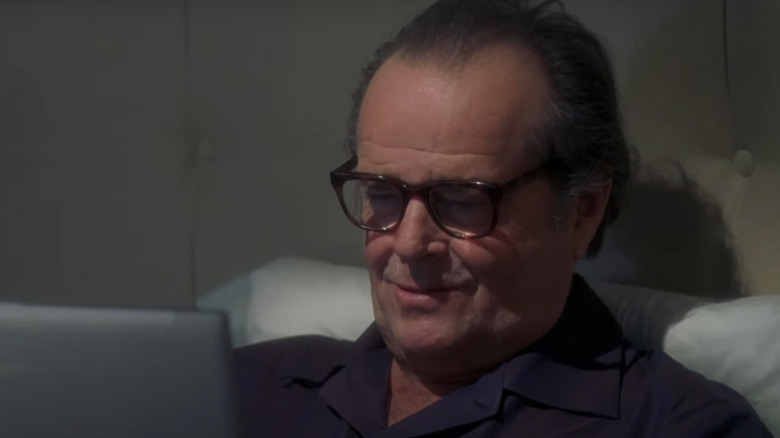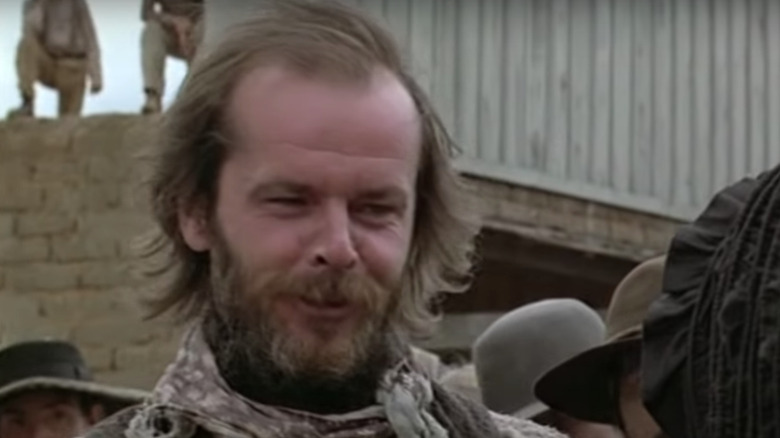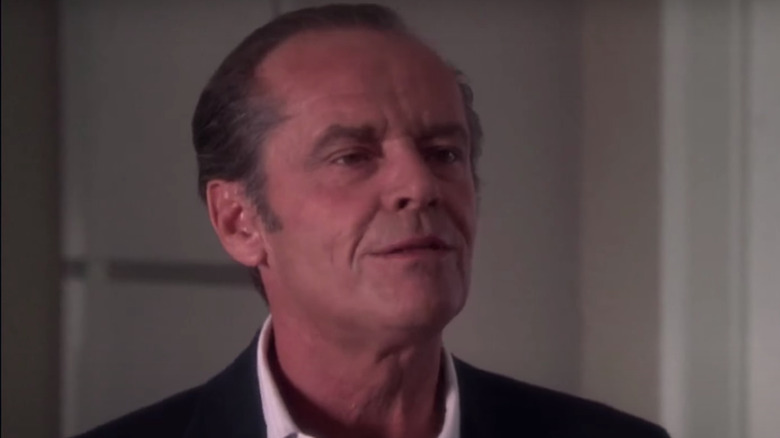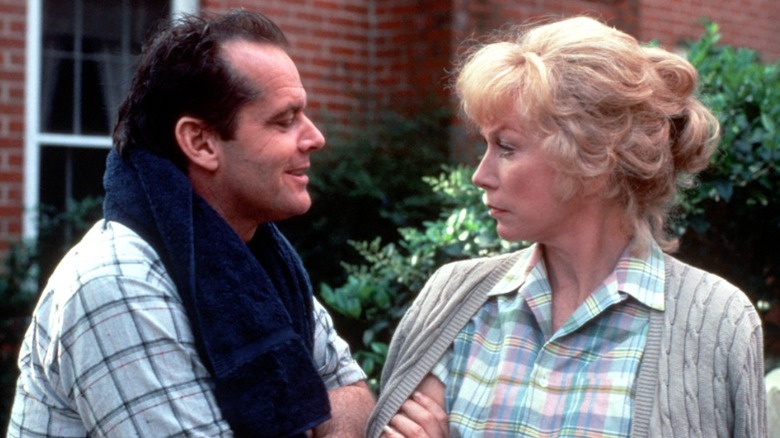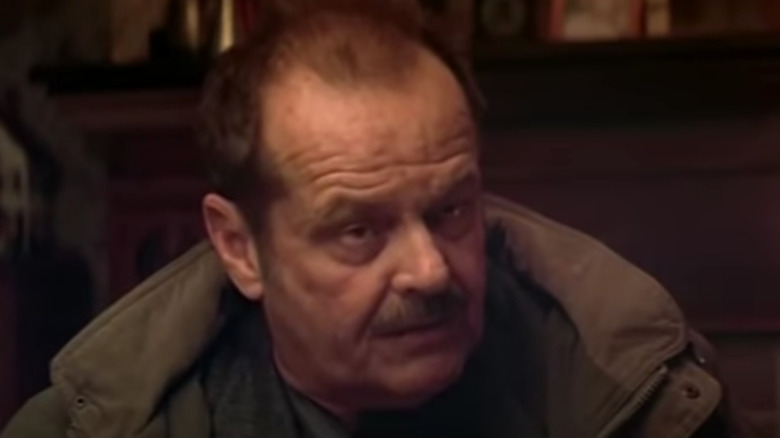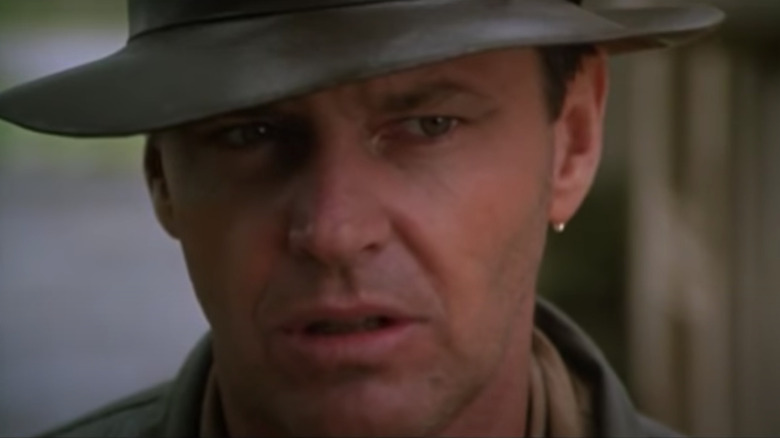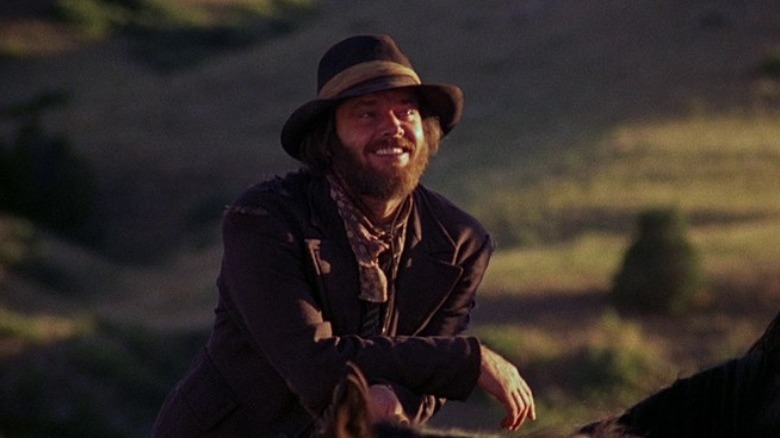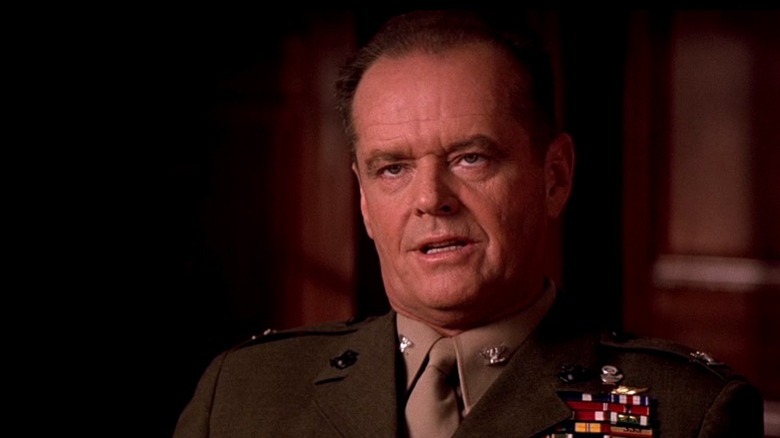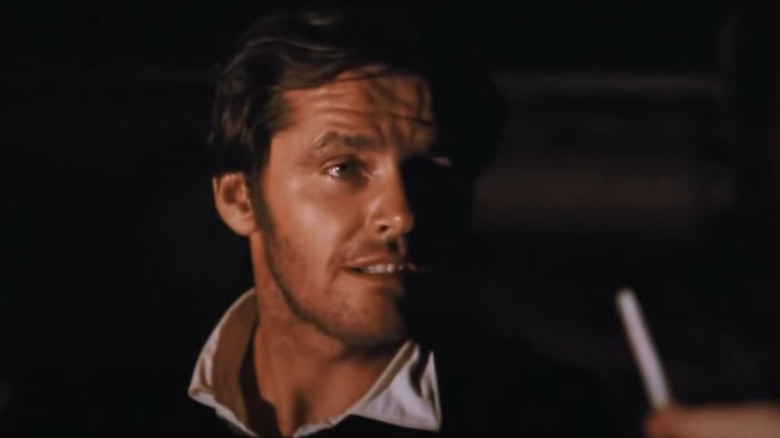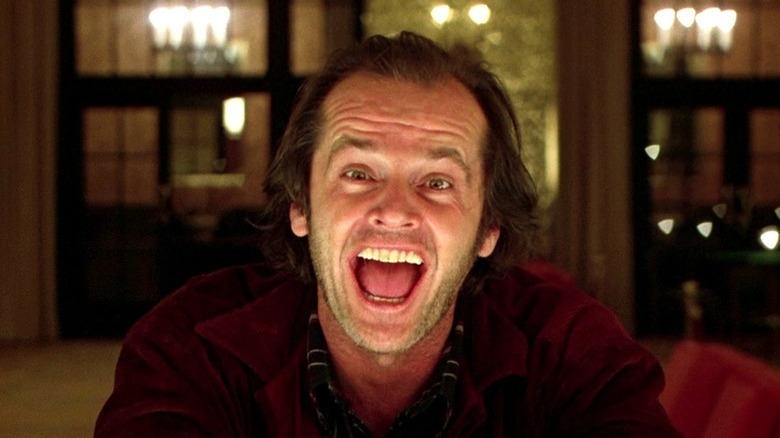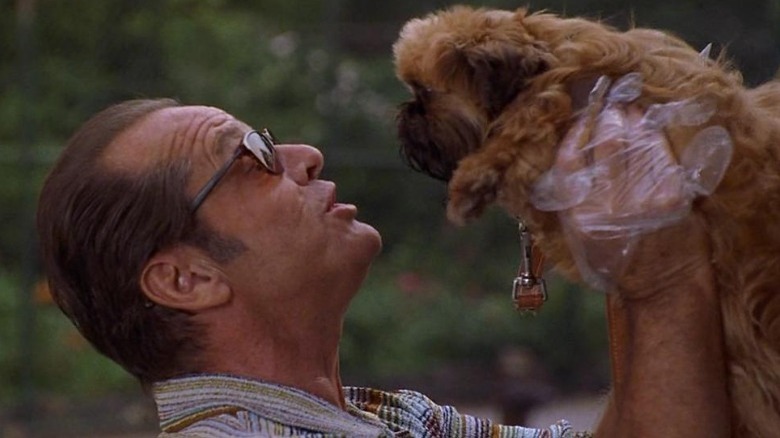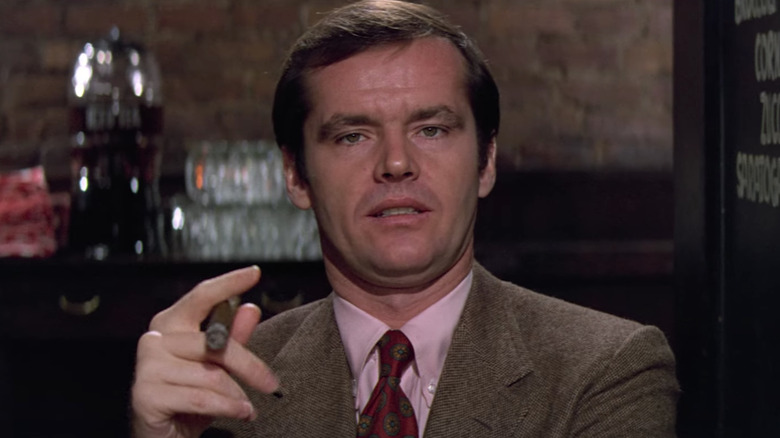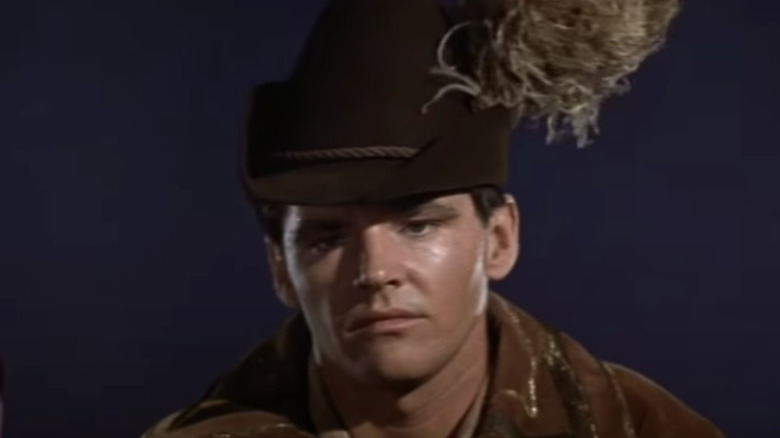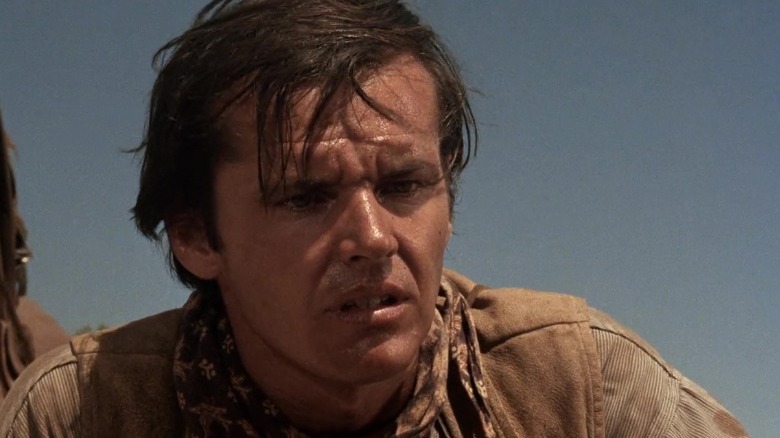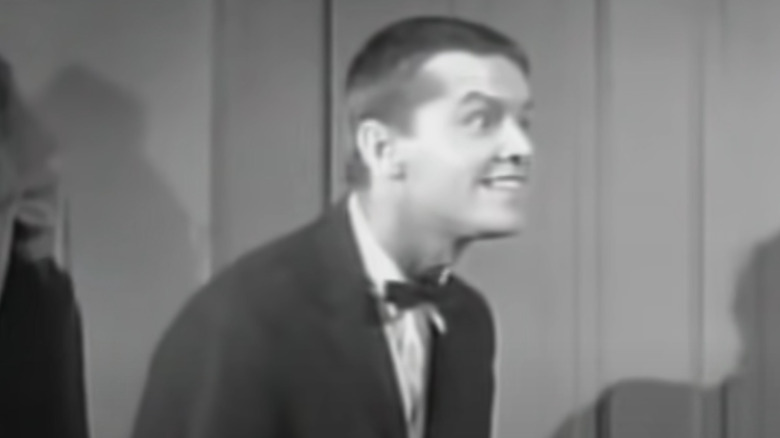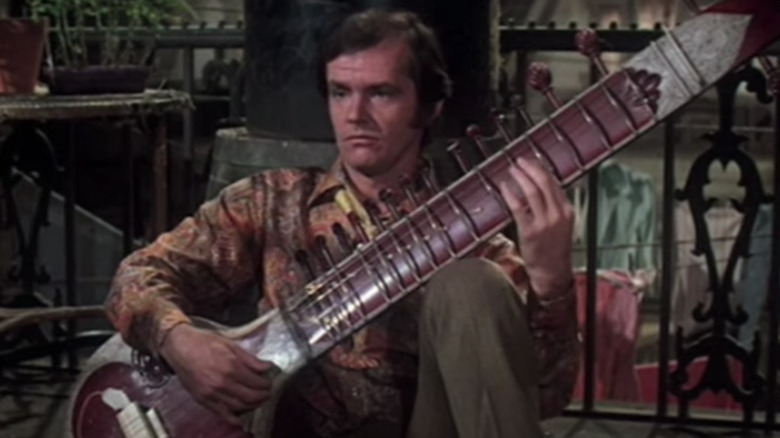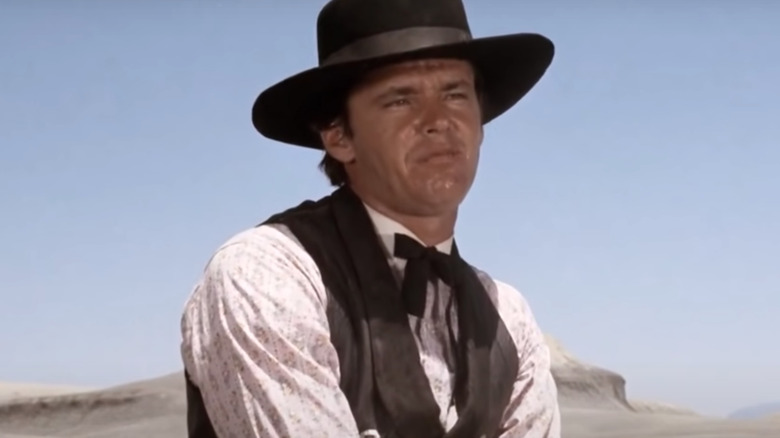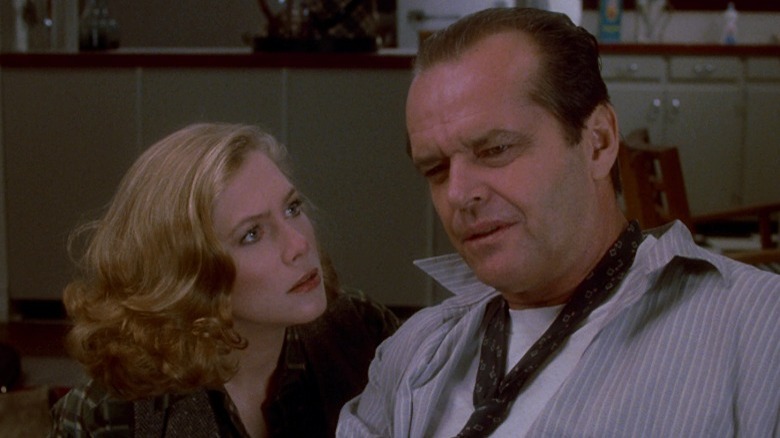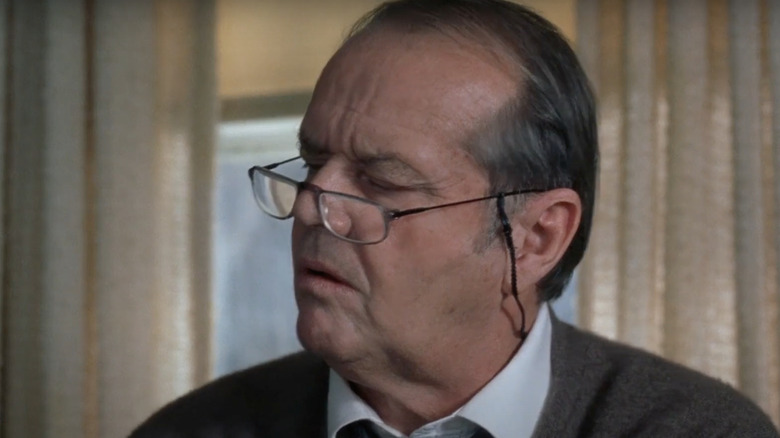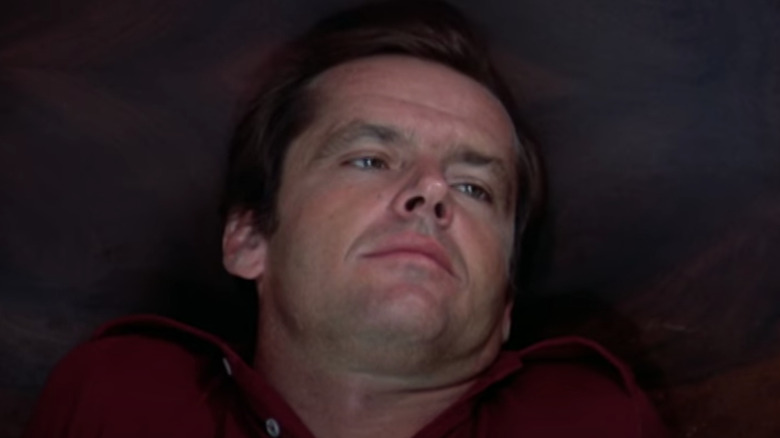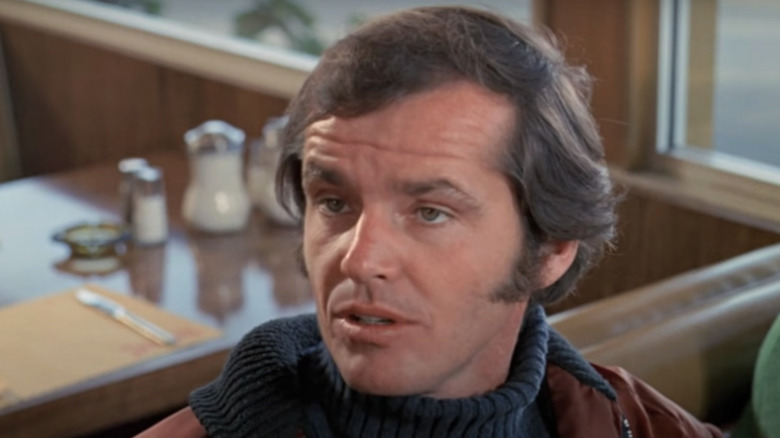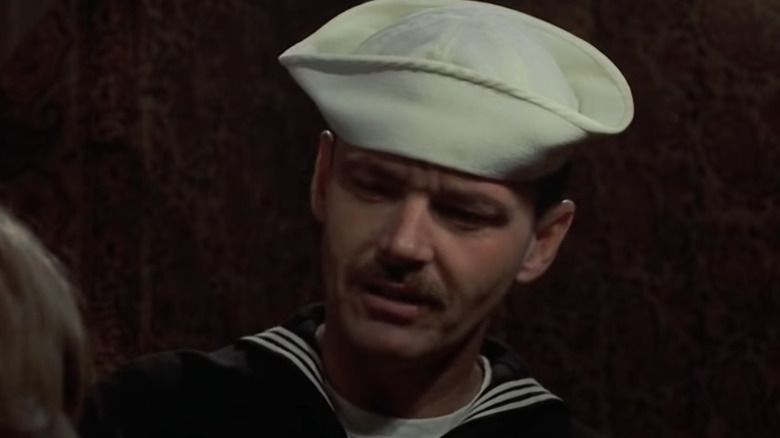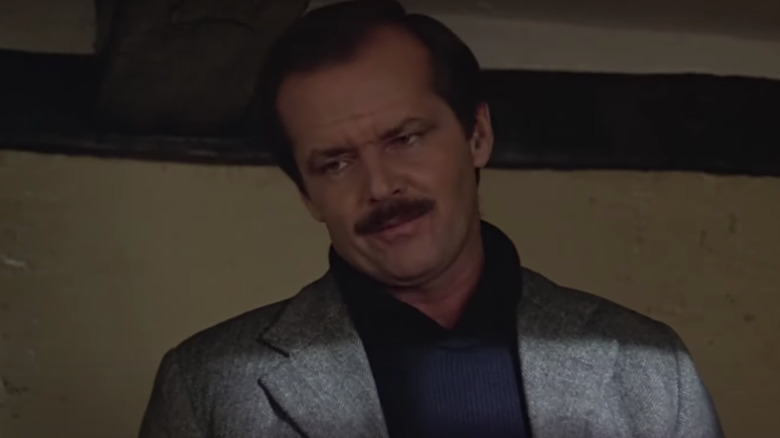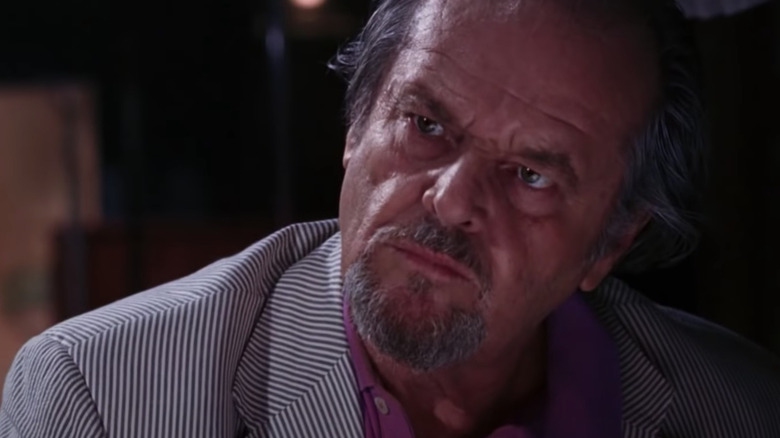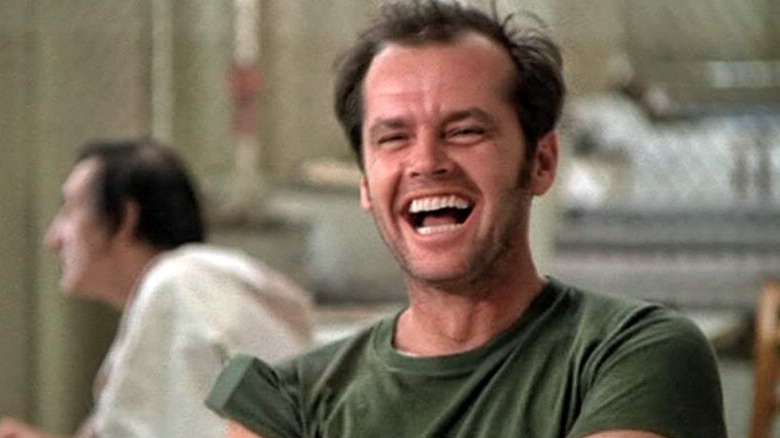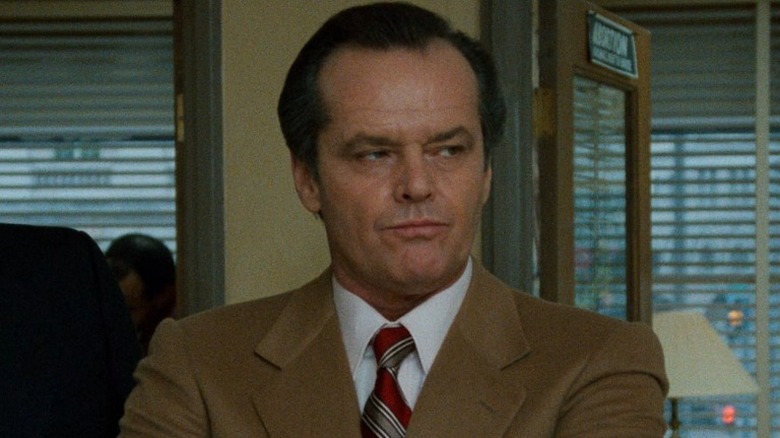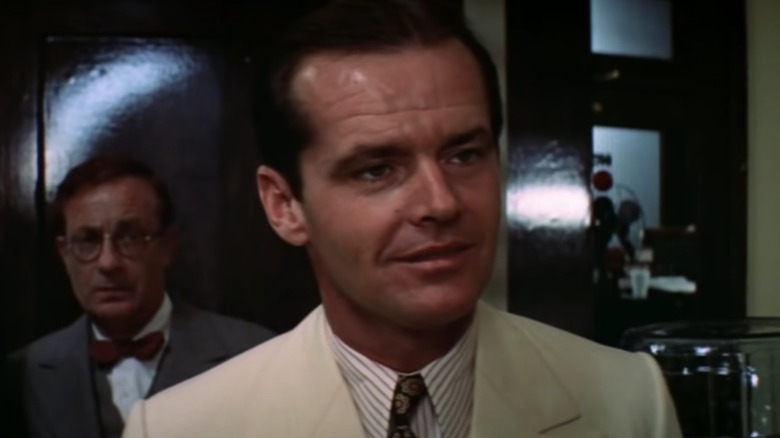50 Greatest Jack Nicholson Movies Ranked Worst To Best
Jack Nicholson is undoubtedly one of the most iconic American actors to have ever lived. With an acting career that began in the late 1950s and soared to unfound heights in the 1970s, Nicholson was an instrumental figure in the shift from Old Hollywood to New Hollywood. Through his exceptional acting talents and his frequent counter-culture screen persona, Nicholson embodied the rebellious spirit on-screen better than perhaps anybody.
Throughout his 54-year-long acting career, Nicholson has racked up numerous accolades for his performances. He was a seven-time nominee and three-time winner at the BAFTAs, a 12-time nominee and three-time winner at the Academy Awards, and even took home the best actor award at the prestigious Cannes Film Festival in 1974. Though Nicholson retired in 2010 and hasn't acted in over a decade, he has left behind a long legacy of incredible performances. Let's take a look at his best movies ranked according to their aggregated critic scores on Rotten Tomatoes.
50. Man Trouble
"Man Trouble" is Jack Nicholson's lowest-rated film according to Rotten Tomatoes critics and is an unfortunate case of a movie that sounds great on paper but turned out to be a muddled mess in execution. The premise of a man who trains guard dogs getting wrapped up in a blackmail plot sounds decent enough, but it is the people involved behind the scenes that make the film seem really promising. Alongside Jack Nicholson, the cast featured the talents of Ellen Barkin, Harry Dean Stanton, Michael McKean, and Beverly D'Angelo.
Directing the film was Bob Rafelson, who Nicholson had previously collaborated with on some of his most pivotal films like "The King of Marvin Gardens," "The Postman Always Rings Twice," and "Five Easy Pieces." Writing the script for "Man Trouble" was another talented Nicholson collaborator, Carole Eastman, who wrote the aforementioned "Five Easy Pieces" and another highly acclaimed film from early on in Nicholson's career, "The Shooting."
The remarkable gathering of talent on both sides of the camera is sadly hard to appreciate in the end product. The critics of Rotten Tomatoes ravaged the film and called it a disappointing reunion for a comedy that is horribly unfunny.
49. A Safe Place
"A Safe Place" is a bizarre film that defies categorization. The film's poster declares itself "a rare and unique experience" and a "new dimension in filmmaking." This 1971 trip of a movie was the feature-film debut of writer and director Henry Jaglom and stars the trio of Tuesday Weld, Orson Welles, and Jack Nicholson. The film treats time as a nebulous factor by allowing past, present, and future to mix and mingle in something akin to a fantasy world from the perspective of Tuesday Weld's fragile character.
The experimental elements of the story of "A Safe Place" made it a polarizing piece of filmmaking. Though audiences wrote it off as pretentious, meaningless nonsense, there are some defenders of the film. Time Out gave the film a moderately positive review and found much to appreciate within the subtext of the film, calling it "sometimes indulgent, often fragile, and occasionally enchanting." There was enough artistic merit within "A Safe Place" to warrant inclusion in the Criterion Collection.
48. The Cry Baby Killer
Jack Nicholson's third lowest-rated movie was also his first ever film role. Right out of the gate, Nicholson found himself in a starring role as Jimmy Wallace, a mild-mannered teenager who winds up in a deadly standoff with the law after a scuffle with two thugs leaves him unwittingly believing he has committed double homicide. Nicholson was 21 years old at the time of the film's release, but it would take him several more years before his acting career found substantial success.
"The Cry Baby Killer" was produced by Roger Corman, who was notorious for making movies extremely fast and cheap. Throughout his lengthy career, Corman has produced over 500 movies. This collaboration kickstarted a long-running working relationship between Jack Nicholson and Roger Corman, which proved vital to the early stage of his acting career. Following "The Cry Baby Killer," Nicholson and Corman would go on to work together an additional eight times throughout the 1960s.
47. The Evening Star
"The Evening Star" is a drama from 1996 that you might be surprised to learn is a sequel to the critically acclaimed James L. Brooks film "Terms of Endearment" from 1983. This 13-years-later follow-up features the same group of characters and checks in on how their lives have changed over time and their various dramatic and romantic travails. Original writer and director James L. Brooks did not return, but the story was again adapted from the Larry McMurtry "Houston" series. "The Evening Star" is the final installment of the series, though the other four books have never been adapted for the big screen.
Jack Nicholson reprises his role from "Terms of Endearment" as Garrett Breedlove, and other cast members include Bill Paxton, Juliette Lewis, and Miranda Richardson, with Shirley MacLaine once again in the lead role. Iconic film critic Roger Ebert gave the film a 1.5-star review and called it, "a completely unconvincing sequel," and said that it was "thin and contrived."
46. The Fortune
Though they made a couple of critical hits together, "Man Trouble" wasn't the only critically reviled collaboration between star Jack Nicholson and screenwriter Carole Eastman. "The Fortune" is another example of a remarkable gathering of talent being squandered. In addition to Nicholson starring and Eastman writing, the other two lead roles were filled by Warren Beatty and Stockard Channing, and in the director's chair was Mike Nichols, the Oscar-winning director of "The Graduate."
"The Fortune" is set in the 1920s and centers around a particular law of the time known as The Mann Act, which forbade a woman from being transported across state lines for what was considered "immoral purposes." In this film, the woman in question is played by Stockard Channing, who is an heiress to a vast fortune. Nicholson and Beatty play a pair of hustlers who work together to get her across state lines but both wind up falling in love with her. The film was intended as a comedy in the vein of the old screwball comedies of classic Hollywood, but most Rotten Tomatoes critics agreed that "The Fortune" missed the mark when it came to tone and humor. Critic Emmanuel Levy summed up the film as "an artistic and commercial misfire."
45. Hell's Angels on Wheels
One of the most important films early on in Jack Nicholson's acting career was the counter-culture motorcycle movie "Easy Rider," so it is interesting to note that just two years earlier, Nicholson starred in a different motorcycle movie that was received in a less favorable light. Nicholson stars as a gas station attendant who is eager to join up with the Hell's Angels biker gang. He finds their willingness to indulge in violence and murder shocking and gets himself into trouble when a romance begins to form between him and the girlfriend of the gang leader.
As one might guess from the title, "Hell's Angels on Wheels" centers around the real-life biker gang, the Hell's Angels. Though there were numerous biker films released in the 1960s, this one has the distinction of including the participation of many real-life Hell's Angels bikers, including the gang's president, Sonny Barger.
"Hell's Angels on Wheels" was another Roger Corman-produced film, but it featured the cinematography talents of László Kovács, who would go on to shoot dozens of critically acclaimed films over the next couple of decades, including "Easy Rider." Roger Ebert gave "Hell's Angels on Wheels" a 2.5-star review and said "the plot has holes big enough to drive a Harley-Davidson through. But the film is better than it might have been."
44. How Do You Know
The final film of Jack Nicholson's acting career before he chose to retire was 2010's "How Do You Know." Sadly, this acting titan went out on a whimper rather than a bang. Reese Witherspoon stars as an over-the-hill softball player in the middle of a love triangle between Paul Rudd and Owen Wilson. Nicholson plays the father of Paul Rudd's character, who runs the company Rudd is fired from near the film's beginning.
With an over-inflated budget of $120 million, "How Do You Know" was a massive box office failure, earning back less than $50 million worldwide. Beyond being both a financial and critical disappointment as Jack Nicholson's final film, "How Do You Know" is a triple disappointment as it also proved to be the last movie of writer/director James L. Brooks, who had previously collaborated with Nicholson on the highly acclaimed films "Broadcast News," "Terms of Endearment," and "As Good as It Gets."
43. The Terror
Released in 1963, "The Terror" is another collaboration between Roger Corman and Jack Nicholson early in his career. Nicholson stars as a stranded French soldier who takes refuge in the seemingly haunted castle of Baron von Lepp, played by horror icon Boris Karloff. "The Terror" had a notoriously messy production, and the end product reflects that messiness. Production began without a finished script, and different directors were constantly rotating throughout the production. As many as seven people each took a turn in the director's chair before they were either fired, quit, or were otherwise replaced. This list of directors included Roger Corman himself and directors who would become big names in the future: Jack Hill, Monte Hellman, and Francis Ford Coppola — even Nicholson himself spent a day in the director's chair.
"The Terror" is somewhat of an infamous film owing to its inclusion in the public domain, which meant it could be re-released, mashed up, and incorporated into other projects ad nauseam. Even if you have never watched "The Terror," there is still a chance that you may have seen footage from it used in other projects. Along with various other films, clips from "The Terror" can be seen in the Peter Bogdanovich film "Targets" released five years later, and also starring Boris Karloff, this time as a character based on himself, a horror star named Byron Orlok.
42. The Bucket List
The penultimate film of Jack Nicholson's career before retirement (if we don't count a cameo as himself in Casey Affleck's "I'm Still Here") was "The Bucket List." This was one film that generated extreme disagreement on Rotten Tomatoes, receiving a rotten score from critics, while proving popular with wider audiences who gave it a strong fresh solid rating. This 2007 dramedy stars the duo of Jack Nicholson and Morgan Freeman as two men who decide to leave the hospital where they are both being cared for as terminally-ill patients and cross as many things off of their bucket lists as possible while coming to terms with their mortality.
The film was directed by Rob Reiner, who also directed Nicholson in 1992's "A Few Good Men," for which Nicholson was nominated for the best supporting actor Academy Award. The film was a hit with many viewers but critics found it overly schmaltzy. Among those disappointed with the film was Richard Crouse, who called it "a predictable movie that seems to try and manipulate the viewer into bursting into tears when he or she might only be trying to suppress yawns."
41. The Last Tycoon
"The Last Tycoon" is set in Hollywood in the 1930s and follows a movie producer who is hailed as a genius while working himself to the bone. The story had a strong foundation as it was adapted from the final, unfinished novel written by F. Scott Fitzgerald, author of "The Great Gatsby."
Similar to "Man Trouble" and "The Fortune," "The Last Tycoon" is another film that features an incredible gathering of talent both in front of and behind the camera but for whatever reason sadly fell short in execution. The impressive cast also features the likes of Robert De Niro, Donald Pleasance, Anjelica Huston, John Carradine, Tony Curtis, and Robert Mitchum.
"The Last Tycoon" undeniably had a wealth of talent behind the camera, with a script by Harold Pinter, the three-time BAFTA winner and two-time Oscar-nominated screenwriter of movies like "The Go-Between," "The Pumpkin Eater," "The Betrayal," and "The French Lieutenant's Woman." Meanwhile in the director's chair was the two-time Oscar-winning director Elia Kazan, the man behind classics like "On the Waterfront," "A Streetcar Named Desire," and "East of Eden," amongst others. However, despite having all the ingredients of a great film, it still wound up as a misfire with most Rotten Tomatoes critics considering it dull and lifeless.
40. Anger Management
"Anger Management" from 2003 paired up Jack Nicholson and Adam Sandler for a crass comedy that will likely appeal to Sandler's usual comedy movies but is less likely to work for others. Sandler plays an everyday man who gets sentenced to court-mandated anger management counseling after an extreme altercation aboard an airplane. Nicholson plays the unconventional anger management counselor, who puts Sandler's character through the opposite of traditional therapy. The supporting cast is much stronger than the average Adam Sandler comedy with appearances by Woody Harrelson, Marisa Tomei, Luis Guzmán, and John Turturro.
"Anger Management" arrived in the latter stages of Nicholson's acting career. He had already given several successful comedic performances throughout his career before "Anger Management," but perhaps none so low-brow. The movie proved divisive, but certainly has its share of fans. Rotten Tomatoes critics give it a rotten score, but general audiences were kinder to it and gave "Anger Management" a fresh score.
39. Heartburn
"Heartburn" is a romantic drama from 1986 that left Rotten Tomatoes critics and audiences alike a little cold, but the project had a lot of promise. A romance between the powerhouse leads of Jack Nicholson and Meryl Streep already sounds like a winning combo on paper, and the film's potential skyrockets even higher with Mike Nichols in the director's chair and a screenplay from Nora Ephron, adapted from her novel of the same name.
The impressive supporting cast also includes the likes of Jeff Daniels, Stockard Channing, Mamie Gummer, (Meryl Streep's real-life daughter), and even acclaimed filmmaker Milos Forman in one of the only substantial acting roles of his career. Forman previously directed Nicholson in one of his most highly acclaimed films, "One Flew Over the Cuckoo's Nest." "Heartburn" had a lot of hype around it ahead of its release but, unfortunately, left most people disappointed. This was a sentiment shared by famed film critic duo Siskel & Ebert on their television show, where they both came down hard on the film, calling it flimsy, unfunny, lacking in conflict, and having nothing to say. They criticized both Nora Ephron's script and Mike Nichols' direction, suggesting that Streep and Nicholson were wasted on weak material, and labeling the project a regrettable failure.
38. Hoffa
"Hoffa" is a biopic telling the true story of the life of Jimmy Hoffa, the head of the Teamsters Union who had ties to organized crime and disappeared without a trace in the 1970s. Nicholson stars in the titular role, wearing prosthetics to make his appearance resemble the real Jimmy Hoffa more closely. Co-starring alongside Nicholson was Danny DeVito, who also produced and directed "Hoffa" as his third feature film.
Writing the screenplay for this dramatized true story was David Mamet, the acclaimed playwright and screenwriter behind projects like "Glengarry, Glen Ross," "House of Games," "The Untouchables," and another Jack Nicholson film that was better received, "The Postman Always Rings Twice." "Hoffa" polarized critics and audiences on Rotten Tomatoes. More than half of the people who rated the film found it worthwhile, but "Hoffa" landed just short of securing a fresh score from either party. Roger Ebert gave "Hoffa" a ringing endorsement, highlighting Danny DeVito's directorial prowess as a highlight.
37. Mars Attacks!
After working together for the first time on 1989's "Batman," Jack Nicholson and director Tim Burton reunited seven years later for the gonzo alien invasion movie "Mars Attacks!" This intentionally cheesy sci-fi comedy was a throwback to older sci-fi films from the 1950s, serving as both a spoof and a homage. Nicholson plays the president of the United States, who is thrust into a tense and dangerous situation with the arrival of deadly invaders from Mars. Playing a dual role, Nicholson also took on the supporting character of a sleazy land baron who gets killed during the invasion.
Far from being the only big name on the cast, Nicholson was joined by a cavalcade of stars, including Natalie Portman, Pierce Brosnan, Michael J. Fox, Annette Bening, Danny DeVito, Martin Short, Glenn Close, Pam Grier, and more. The massive, star-studded cast was the major audience draw for "Mars Attacks!," but the reception to the film was far from unanimous. Some connected with the particular brand of humor employed by "Mars Attacks!" while many were not on the film's wavelength. The New York Times gave the movie a negative review, calling it "just a parade of scattershot gags, more often weird than funny and most often just flat."
36. Ironweed
The year after they starred together in the maligned "Heartburn," Jack Nicholson and Meryl Streep teamed up again for "Ironweed" from director Hector Babenco. The result was somewhat better received but still not enough to earn a fresh score on Rotten Tomatoes. "Ironweed" is set in New York during the Great Depression. Nicholson and Streep star as two homeless people in tough times dealing with alcoholism, sickness, and debilitating depression. The story was adapted from the novel of the same name, with William Kennedy writing both versions. Supporting Nicholson and Streep on the cast were the talents of Nathan Lane, Tom Waits, and Fred Gwynne.
This heavy drama depicts a troubled time without offering much in the way of hope. This crushing bleakness and lack of redemption was a point of focus for many film critics who disliked the film, accusing it of wallowing in despair to an excessive degree. Variety was highly critical of the film, writing "Unrelentingly bleak, 'Ironweed' is a film without an audience and no reason for being except its own self-importance." Though the film as a whole might not have fared too well critically, Nicholson and Streep still came out looking good and both earned Oscar nominations for their performances.
35. Studs Lonigan
"Studs Lonigan" is a 1960 drama set in Chicago in the 1920s. The titular character of Studs Lonigan is a young man who attempts to break free from the environment he was born into, which is full of squalor and violence, conditioning him to turn toward violence as well. The lead was portrayed by Christopher Knight in one of the only two film roles of his career. Jack Nicholson plays the supporting role of Weary Reilly, a bully that Studs takes on in a fistfight. Though it only has a handful of critic reviews counted, "Studs Lonigan" is the first of Nicholson's films to land a fresh score on Rotten Tomatoes.
The story was adapted from the novel "Young Lonigan" by James T. Farrell and first published in the early 1930s. As opposed to the 1920s setting of the film, the book takes place in the 1910s. The "Young Lonigan" novel was the first installment in a trilogy of books following the Studs Lonigan character throughout his life. The other two books were never adapted for the big screen, though the complete trilogy was filmed as a television mini-series in 1979.
34. Blood and Wine
"Blood and Wine" was one of many collaborations between star Jack Nicholson and director Bob Rafelson. Faring much better than their previous collaboration, "Man Trouble," "Blood and Wine" managed to score a marginally fresh score from Rotten Tomatoes critics, although general audiences still left it with a rotten score.
Nicholson stars as a man with a failing wine business who needs money to stay afloat and enlists the help of his safecracking friend, played by Michael Caine, to pull off a diamond heist. In an interesting spin on the typical conventions of the heist movie genre, the actual diamond robbery itself offers little challenge to the characters. Instead, it is the sale of the diamonds after the robbery which proves difficult and dangerous. Rounding out the main cast are Judy Davis, Jennifer Lopez, and Stephen Dorff. Roger Ebert appreciated the subversion of heist movie tropes and recommended the film, calling it "richly textured" and saying it contained "one of Nicholson's best performances."
33. Wolf
In "Wolf," Jack Nicholson plays a book publisher who gradually turns into a werewolf after being bitten by one. Contrary to most werewolf movies where the transformation is a damnable curse, Nicholson instead finds his life drastically improving in the immediate aftermath of the werewolf bite. His lust for life is reinvigorated and he improves his standing at his job, all while winning the heart of his boss' daughter, played by Michelle Pfeiffer. Also appearing in the cast are Christopher Plummer, David Hyde Pierce, and James Spader.
Following the unfortunate reception of "The Fortune" and "Heartburn," "Wolf" Nicholson's final collaboration with director Mike Nichols proved much more popular with critics and audiences alike, receiving a fresh score on Rotten Tomatoes. In his review for Rolling Stone, Peter Travers called the movie "a rapturous romantic thriller with a darkly comic subtext" and praised the work done by both Nichols behind the camera and Nicholson in the lead role.
32. The Border
Set on the border between Texas and Mexico, "The Border" finds Jack Nicholson playing a corrupt border agent who strives to change his ways by helping an immigrant mother after her baby is stolen. Harvey Keitel, Warren Oates, Elpidia Carillo, and Valerie Perrine round out the rest of the main cast. The film was released back in 1982, but the subject and themes have remained relevant and topical over the years as corruption amongst U.S. border agents persists today.
"The Border" was directed by Tony Richardson, who previously won the best director and best picture Oscars for his 1963 film "Tom Jones," and won the best British screenplay and best British film BAFTAs for his 1961 film "A Taste of Honey." Though this 1980s drama didn't quite live up to the acclaim of his 1960s output, "The Border" was still well received and earned a fresh score from Rotten Tomatoes critics. Gene Siskel had some issues with the film, including its ending, but found the movie to still be worth watching and leveled special praise toward Nicholson's performance, calling it his best leading role since "One Flew Over the Cuckoo's Nest."
31. The Two Jakes
While certainly not one of the best films of Jack Nicholson's career, "The Two Jakes" is arguably one of the most interesting. In addition to acting, Nicholson also stepped behind the camera on rare occasions, and "The Two Jakes" is one of just a handful of films Nicholson directed throughout his career. Nicholson wasn't originally supposed to direct the movie but wound up stepping in after behind-the-scenes conflicts threatened the future of the production.
Released in the 1990s, "The Two Jakes" was a long-belated sequel to "Chinatown," one of Nicholson's most highly acclaimed films, made in 1974. Nicholson reprised his role as private detective J.J. Gittes and replaced Roman Polanski in the director's chair, while the screenwriter of the original, Robert Towne, returned for the sequel. "Chinatown" was initially intended to be the start of a trilogy, but the full series never came to fruition.
Similar to the first film, "The Two Jakes" finds the private eye protagonist getting caught up in another complex crime, mystery plot, this time involving murder, adultery, and oil mining. Though the film was moderately well received, fans of the original "Chinatown" were in for a bit of a disappointment as most critics agreed that "The Two Jakes" didn't come close to living up to the legacy of the original film. Even still, plenty of critics found it worth watching as long as you went in with lowered expectations. Critic Philip French of The Observer summed up the reaction in his review, writing "The verve, dramatic propulsion and sense of evil that informed Polanski's 'Chinatown' is largely missing from 'The Two Jakes.' But it is, for all its murkiness, an intelligent, enjoyable noir thriller." Whether the film's lukewarm reception was to blame or not, "The Two Jakes" wound up being the last film that Nicholson helmed from the director's chair.
30. The Witches of Eastwick
"The Witches of Eastwick" is Jack Nicholson's first movie to land fresh scores with both critics and general audiences on Rotten Tomatoes. Based on a novel written by John Updike, Jack Nicholson plays the male lead opposite Susan Sarandon, Michelle Pfieffer, and Cher as three divorcees who are each seduced by Nicholson's devilish character through unnatural means. The novel received a sequel, but a follow-up film was never produced. An alternate adaptation of the book was made as a TV movie in the early 2000s, and, later in the decade, it was adapted again into an ABC television series.
"The Witches of Eastwick" was directed by George Miller as his first film after completing his initial "Mad Max" trilogy. Miller amped up the events of the novel by injecting more special effects and zany humor, which polarized some viewers. Variety recommended the film, highlighting Nicholson as its greatest strength. This sentiment was shared by many outlets, with The Hollywood Reporter and Gene Siskel echoing the praise for Nicholson's performance.
29. The King of Marvin Gardens
When "Five Easy Pieces" hit theaters in 1970, it put Jack Nicholson and director Bob Rafelson on the map as major talents to keep an eye on. Their follow-up film, released two years later, was "The King of Marvin Gardens." This second drama didn't leave the same monumental impression as their prior collaboration, but it was still well-received by most critics.
Jack Nicholson plays a radio host, Bruce Dern plays his con-man brother, Ellen Burstyn plays his partner in crime, and Julia Anne Robinson plays her stepdaughter. Nicholson is the mark in this con-man scheme involving a land deal on a tropical island, but he isn't quite as gullible as his brother thought. Also notable on the cast is Scatman Crothers, who would go on to act alongside Nicholson again in "The Shining." Some critics, like Roger Ebert, found "The King of Marvin Gardens" to be a mostly worthy follow-up to "Five Easy Pieces," while others, like Roger Greenspun of The New York Times, found it to be a major letdown that went as far as to hurt the perception of that earlier collaboration. Greenspun elaborated further, writing that what "looked like quality to some in 'Five Easy Pieces' two years back [now] looks like the most pretentious of tired clichés, a low‐keyed but very empty bombast exploiting rather than exploring its themes."
28. Batman
Though it might stick out like a sore thumb when compared to the current wave of massively popular superhero movies of the MCU and DCEU, or even to Christopher Nolan's "Dark Knight" trilogy, Tim Burton's big screen take on "Batman" was instrumental in the development of the superhero movie genre. Compared to the Adam West "Batman" television series, Tim Burton's "Batman" offered a much darker and more serious take on the Caped Crusader, and Jack Nicholson's portrayal of The Joker left an indelible mark on one of pop culture's most iconic villains.
"Batman" was a massive box office success (earning over $411 million worldwide against a $35 million budget) and became a cultural touchstone for subsequent superhero movies. Burton helmed a sequel with Michael Keaton returning in the lead role, "Batman Returns," but the reception was less overwhelmingly positive the second time around. Burton's take on the character remained the definitive big-screen version of Batman until Christopher Nolan's trilogy 16 years later.
27. Something's Gotta Give
"Something's Gotta Give" is a 2003 rom-com from writer and director Nancy Meyers, who had worked in similar territory with the likes of "What Women Want," "The Holiday," "Father of the Bride," and "It's Complicated." Nicholson stars as a record producer with a penchant for dating younger women, and Diane Keaton plays the one appropriately aged woman who wins his heart. Fleshing out the supporting cast are Frances McDormand, Amanda Peet, and Keanu Reeves.
Arriving as one of the final films of Nicholson's acting career before his retirement, "Something's Gotta Give" is one of his most acclaimed later films. The advanced age of the leads was integral to the plot and helped to make an indelible impression and set the film apart from similar romantic comedies. Peter Travers of Rolling Stone recommended the film, calling Nicholson "hilarious" and writing that "Keaton nails every laugh and nuance ... She steals your heart and the movie."
26. Goin' South
"Goin' South" is a Western comedy from 1978 set in Texas just after the end of the Civil War. Jack Nicholson stars as a horse thief who is due to be hanged but winds up getting a second chance through a special law the town has that allows the condemned to escape the gallows via marriage. Mary Steenburgen plays the local woman who takes his hand in marriage, albeit with an ulterior motive. Also of note in the cast are Danny DeVito, Nancy Cartwright, John Belushi, and Christopher Lloyd.
Beyond starring in the film, "Goin' South" was one of a handful of films that Jack Nicholson directed throughout his career. This is the highest rated of Nicholson's directorial efforts according to Rotten Tomatoes critics, some of whom noted Nicholson's direction as a surprising strength of the film. It would be 12 years before he directed another movie, "The Two Jakes," to less favorable though still positive results.
25. The Crossing Guard
"The Crossing Guard" is a crime thriller with heavy dramatic elements from 1995 that finds Jack Nicholson obsessing over revenge. After his daughter was killed by a drunk driver, played by David Morse, Nicholson's character has spent the following six years planning and fantasizing about taking deadly revenge while waiting for the driver to be released from prison. Rather than killing the drunk driver immediately, he gives him a heads up; he will be murdered in one week. "The Crossing Guard" explores this week as Nicholson's character spirals deeper into his unhealthy obsession and Morse's character tries to come to terms with his imminent death.
Robin Wright, Piper Laurie, Anjelica Huston, and John Savage fill out the supporting cast amongst others. The film had one other notable actor in the mix, but rather than appearing on screen, he operated behind the scenes. "The Crossing Guard" was written and directed by actor Sean Penn; his second film after "The Indian Runner" in 1991, which also starred David Morse. Penn's direction drew both acclaim and criticism from Rotten Tomatoes critics with some suggesting he seemed to lack a firm grasp of the story, while others applauded him for bringing strong performances out of his leads.
24. Terms of Endearment
Though its belated sequel, "The Evening Star," was extremely poorly received, "Terms of Endearment" is considered by most Rotten Tomatoes critics to be a classic of Jack Nicholson's filmography. In fact, Rotten Tomatoes critics enjoyed it enough to give "Terms of Endearment" the coveted Certified Fresh badge, and general audiences rated it even higher.
The mother/daughter relationship between the characters played by Shirley MacLaine and Debra Winger is the heart of the film, and the male side of the cast is no less impressive with Jack Nicholson, Jeff Daniels, Danny DeVito, and John Lithgow all filling major roles. Writing the screenplay and directing the film was the acclaimed James L. Brooks in his directorial debut. He came out of the gates about as strong as any filmmaker possibly could, winning three Academy Awards in the writing, directing, and overall best picture categories. Shirley MacLaine and Jack Nicholson also took home Oscars for their performances, and the film as a whole racked up six additional nominations. This was Nicholson's seventh Oscar nomination and second win.
23. The Pledge
After working together on "The Crossing Guard" in 1995 and finding favorable results, Jack Nicholson returned to star in Sean Penn's next film in the director's chair, "The Pledge." This time around, Nicholson plays a detective who — on the day he was due to retire — makes a promise to a grieving mother that he will find her daughter's killer. When the police get a confession out of an innocent, intellectually disabled man, they consider the case closed, but Nicholson's character is convinced they got the wrong man, and he won't let retirement stop him from finding the real killer by any means necessary.
With Sean Penn's credentials, he was able to cast a large number of great actors who all give memorable performances in roles both big and small. Patricia Clarkson, Aaron Eckhart, Tom Noonan, Robin Wright, Vanessa Redgrave, Helen Mirren, Mickey Rourke, and Benicio Del Toro fill out the impressive cast. "The Pledge" is quite bleak in its subject matter, which was a criticism leveled by some Rotten Tomatoes critics, but the consensus was glowing regardless.
22. The Postman Always Rings Twice
Directly after working with Stanley Kubrick on "The Shining," Jack Nicholson reteamed with his frequent collaborator, director Bob Rafelson, for this 1981 romantic crime thriller, with noir elements. As with "Hoffa," acclaimed playwright and screenwriter David Mamet provided the screenplay for "The Postman Always Rings Twice," though this time the story was taken from the novel of the same name written by James M. Cain. The story was previously brought to the big screen back in 1946 with Lana Turner and John Garfield in the lead roles.
Jessica Lange stars as a femme fatale who takes a liking to a drifter, played by Jack Nicholson, who stops by her husband's diner. The two strike up a passionate affair and are soon enough plotting to murder her husband, played by John Colicos. Anjelica Huston, Michael Lerner, and Thomas Hill play major supporting roles. The cinematography was a noted strength of "The Postman Always Rings Twice" for many Rotten Tomatoes critics, as was the central romance between the leads.
21. The Missouri Breaks
"The Missouri Breaks" is a Western from 1976 that pits two acting titans against each other: Jack Nicholson and Marlon Brando. Nicholson plays the leader of a gang of horse thieves, and Brando plays the notorious sharpshooter hired to gun him and his gang down. The film was directed by triple Oscar-nominated filmmaker Arthur Penn, known for films like "Night Moves," "Alice's Restaurant," and "Bonnie and Clyde." Penn was no stranger to the genre having earlier made the films "The Left-Handed Gun" starring Paul Newman and "Little Big Man" starring Dustin Hoffman.
In a modern review looking back at this 1970s Western, The Guardian found that "The Missouri Breaks" was a film that had gotten significantly better with age. Critic Xan Brooks reflected on how the film was poorly received in its day but had turned around its reputation over the years. He suggested that it contains perhaps the final great performance from Marlon Brando, who spent the production disregarding the script and Arthur Penn's direction and instead did whatever he wanted.
20. A Few Good Men
One of the most quotable pieces of dialogue — if not the single most quotable line — of Jack Nicholson's entire career was delivered in "A Few Good Men." "You can't handle the truth!" is inarguably one of the most quoted, parodied, and spoofed lines of dialogue in pop culture.
Acclaimed screenwriter Aaron Sorkin adapted "A Few Good Men" from his stage play. Principally a courtroom drama, it uses military law in Washington, D.C. to switch up the formula found in other legal thrillers.
Beyond the iconic line referenced above, the entire script is chock full of the type of high-quality dialogue that has become Sorkin's trademark. In the director's chair, Rob Reiner brought together a talented cast that included Tom Cruise, Demi Moore, Kiefer Sutherland, Kevin Bacon, and Kevin Pollak alongside Nicholson in the antagonistic role of Colonel Nathan R. Jessup. Nicholson received one of the film's four Oscar nominations for his performance, with the others arriving in the sound, editing, and best picture categories.
19. Easy Rider
As the 1960s were nearing an end, Jack Nicholson had already been acting for several years, but his career hadn't yet taken off and brought him to superstardom. Toward the end of the decade, Nicholson had been so beaten down by the trajectory of his acting career, that he was considering giving up acting in exchange for a career behind the scenes in movie making. "Easy Rider" changed everything. Though he only played a side character rather than one of the lead bikers, Nicholson drew much attention and acclaim for his supporting performance, earning him his first Oscar and BAFTA nominations. The success of "Easy Rider" revitalized and supercharged his career.
Beyond being one of the most crucial films in the trajectory of Jack Nicholson's career, "Easy Rider" was also one of the most important in the changing tides of the film industry between the '60s and the '70s and was instrumental in ushering in the New Hollywood movement that changed filmmaking forever moving forward.
18. The Shining
"The Shining" is an undisputed masterpiece of the horror genre. The scares, both supernatural and psychological, have cemented a place in genre history. The film frequently lands near the top of comprehensive lists counting down the best horror films ever made, such as Time Out's top 100, the Rolling Stone top 10, the Rotten Tomatoes 10 scariest movies list, and even our own countdown of the top horror films of all time.
Set in the sprawling Overlook Hotel isolated by winter weather, Jack Nicholson performs a tour-de-force descent into insanity. Shelley Duvall, Scatman Crothers, and 6-year-old Danny Lloyd all do great work in their roles as well. Though the film was adapted from the Stephen King novel of the same name, a great deal was changed for the screen, so much so that Stephen King was immensely dissatisfied with the final product. King eventually wrote and produced an alternate adaptation, which aired as a three-part TV mini-series.
Director Stanley Kubrick, who also co-wrote the adapted screenplay with Diane Johnson, was responsible for the changes to the original story and paid King's objections no mind, making the film his own. Kubrick was known for his meticulous attention to detail and for demanding a lot (perhaps too much) from his actors. Shelley Duvall was tormented endlessly on set by Kubrick, and Scatman Crothers was forced to do so many takes that he broke down in tears. Whether the ends justify the means or not, "The Shining" is a certified classic of the horror genre.
17. As Good as It Gets
"As Good as It Gets" provided Jack Nicholson with the role that earned him his third and final Academy Award, and the second he won while collaborating with director James L. Brooks after "Terms of Endearment" 14 years earlier. Rotten Tomatoes critics widely praised Brooks' work on the script and behind the camera while paying special commendation to the lead performances of Jack Nicholson and Helen Hunt.
Nicholson stars as an obsessive-compulsive writer who drives everyone away with his abrasive personality. Helen Hunt, who also won an Oscar for her role, co-stars as the single mother and waitress who works in the writer's go-to diner where all of the other employees refuse to serve him. Greg Kinnear rounds out the trio of main characters as the writer's neighbor, a gay artist who is hospitalized following an assault, leaving his dog in the writer's care. Kinnear was also Oscar-nominated for his performance for best actor in a supporting role, though he lost out to Robin Williams for "Good Will Hunting." The film also earned Oscar nominations in the writing, editing, music, and best picture categories.
16. Carnal Knowledge
"Carnal Knowledge" was the first film to combine the acting talent of Jack Nicholson with the directing talent of Mike Nichols, and it was also the highest rated of their four collaborations according to Rotten Tomatoes critics. This 1971 drama stars the unlikely duo of Jack Nicholson and Art Garfunkel of Simon and Garfunkel fame. The film covers several years in the lives of the two men, from when they first meet as college roommates and become best friends until they reach middle age, with a particular focus on their various sexual exploits. Rita Moreno, Candice Bergen, Carol Kane, Ann-Margret, and Cynthia O'Neal comprise the entirety of the rest of the cast in this limited ensemble film.
Released in the early '70s as the cinematic landscape was undergoing a seismic shift, "Carnal Knowledge" was an extremely controversial film for its time in terms of the sexual content and its use of explicit language. Some critics wrote off the film as misogynistic and heavily reliant on the male gaze while others felt the film probed deeper and served as an insightful commentary on gender dynamics and the way societal mores change over time. The New York Times called "Carnal Knowledge" funny, imaginative, and profound, and Roger Ebert gave the film a perfect four out of four score and called it "Mike Nichols' best film."
15. The Raven
"The Raven" was surprisingly well received as a low-budget film from 1963 in the early stages of Nicholson's career before he found his voice and his career took off. The film was an adaptation of Edgar Allen Poe's famous narrative poem of the same name, though many liberties needed to be taken when expanding a poem of just over 1,000 words into a feature-length film. Nicholson is in a supporting role while horror veterans Boris Karloff, Peter Lorre, and Vincent Price play the leads.
Arguably Nicholson's most important early-career collaborator, Roger Corman was in the director's chair for "The Raven." Corman's reputation for shooting cheap and fast is perhaps best exemplified by this double-production. After wrapping "The Raven" early and having a few extra days with the cast, crew, and castle location, Corman immediately began production on one of Nicholson's lowest-rated films, "The Terror," without a plan, just to maximize the available resources. It's safe to say that "The Terror" wouldn't exist at all if not for "The Raven."
14. Ride in the Whirlwind
"Ride in the Whirlwind" is a Western from early on in the career of Jack Nicholson, released the same year as another acclaimed Nicholson Western, "The Shooting." Both films were directed by Monte Hellman, who previously collaborated with Nicholson on Roger Corman's "The Terror." Jack Nicholson, Cameron Mitchell, and Tom Filer play a trio of everyday cowhands who get mixed up with a murdering, stage-coach-robbing gang of outlaws. As vigilantes attack the outlaws, the cowhands flee but are branded as fugitives and face the relentless pursuit of the vigilante mob, who believe they are chasing down hardened criminals.
One of the most noteworthy elements of "Ride in the Whirlwind" is that in addition to starring in the film, Nicholson also wrote the screenplay. Nicholson wrote or co-wrote a handful of movies in the early stages of his career, leaving the screenwriting behind as soon as he found greater success as an actor at the start of the 1970s. Nicholson wrote pictures for collaborators Bob Rafelson and Monte Hellman, but "Ride in the Whirlwind" is the only film that he both wrote and starred in, though he did write and have a supporting role in Hellman's "Flight to Fury" in 1964.
13. The Little Shop of Horrors
"The Little Shop of Horrors" is the highest-rated and highest-profile collaboration between Jack Nicholson and Roger Corman, despite its humble origins. In typical scrappy Corman fashion, "The Little Shop of Horrors" was made extremely cheaply and quickly. The film was shot in just two days and a night as what the director described as something halfway between an experiment and a joke. This quick, low-stakes production about a man-eating plant wound up taking on a far greater legacy than anyone involved could have ever anticipated.
Though Jack Nicholson's role was small, he stood out and left a major impression as the pain-loving dental patient Wilbur Force. These days, the title "Little Shop of Horrors" might be more likely to bring the 1986 remake to mind rather than the 1960 original. The Frank Oz-directed remake kept the basic premise intact but amped up the comedy, added color, expanded the cast, and turned the whole thing into a bonkers musical, while the original is a low-key horror comedy with low aspirations.
12. On a Clear Day You Can See Forever
Most people don't immediately think of singing when they hear the name Jack Nicholson. Whether it be singing a song in character in a film like "The Fortune" or "Something's Gotta Give," writing and producing the musical movie "Head" starring the members of The Monkees, or making a brief appearance in The Who's rock opera "Tommy," Nicholson did occasionally dabble in musical territory throughout his career. Nicholson's most direct participation in this area came in 1970 with the Vincente Minnelli musical "On a Clear Day You Can See Forever."
The story was adapted from the Broadway musical of the same name written by Alan Jay Lerner. The plot concerns the bizarre romance between a therapist and his patient, who — through hypnosis — comes to believe that she is a reincarnated rich Victorian lady. Barbra Streisand leads a cast that also includes the likes of Bob Newhart and Yves Montand, while Jack Nicholson plays Streisand's stepbrother. Parts of Nicholson's role, including his big musical number, were cut from the film before release, but were luckily restored and made available after the fact.
11. The Shooting
"The Shooting" is the second of two Westerns directed by Monte Hellman and starring Jack Nicholson released in 1966. Whereas in "Ride the Whirlwind" Nicholson was cast in the likable protagonist role, "The Shooting" finds him playing the cold and merciless villain role of Billy Spear, a hired gun at odds with the film's hero, played by Warren Oates, a former bounty hunter attempting to leave his life of violence behind.
The straightforward story follows the journey of a group of distrusting characters as they pursue an unseen and unknown target across the desert landscape. In the mix with Nicholson and Oates are Will Hutchins as the ex-bounty hunter's innocent friend and Millie Perkins as the rich and mysterious woman who hires them to protect her along her journey. The screenplay was the first film written by Carole Eastman, who would go on to write one of the defining films of Nicholson's career, "Five Easy Pieces." Eastman used the pseudonym Adrien Joyce for both scripts.
10. Prizzi's Honor
"Prizzi's Honor" is a dark comedy about two mob assassins, played by Jack Nicholson and Kathleen Turner, who fall in love, causing major troubles when they are contracted to kill each other. Nicholson received an Oscar nomination for his performance, as did two of his supporting cast mates: William Hickey and Anjelica Huston, the latter of whom took home an Academy Award as the sole winner out of the film's eight overall Oscar nominations.
The film was a family affair for Anjelica Huston as she was working under the direction of her father, acclaimed filmmaker and actor John Huston. No stranger to working with family, John Huston had earlier directed his father in the 1948 film "The Treasure of the Sierra Madre." Both family members won Oscars for their work on their respective movies. Jack Nicholson and Anjelica Huston were in a relationship in real life during the making of "Prizzi's Honor," and Roger Ebert suggested that the off-screen dynamic between Nicholson and the two Hustons was a major part of what helped make the film "a treasure" and one of Huston's best films.
9. About Schmidt
The final Oscar nomination of Jack Nicholson's career before retirement arrived within Alexander Payne's "About Schmidt." Co-star Kathy Bates was also Oscar-nominated for her role in the film, while Hope Davis, June Squibb, and Dermot Mulroney rounded out the rest of the cast.
"About Schmidt" follows Nicholson as the titular Warren Schmidt, a recently retired man endeavoring an RV road trip to reach his daughter's wedding. The film is a dramedy of the style that writer/director Alexander Payne has often explored throughout his career in the likes of "Nebraska," "Election," and "Sideways."
Alexander Payne's adapted screenplay was based on the novel of the same name written by Louis Begley. Begley wrote two sequels to the book following the same character called "Schmidt Delivered" and "Schmidt Steps Back" but these have not yet been adapted for the big screen. Rotten Tomatoes critics widely recommended the film, calling it as funny as it was heartfelt.
8. The Passenger
Fresh off of his Oscar-nominated turn in "Chinatown," Jack Nicholson headed off to the Sahara desert to work with acclaimed Italian filmmaker Michelangelo Antonioni, known for films like "Blow-Up," "Zabriskie Point," and "L'Avventura." "The Passenger" finds Nicholson playing a war correspondent who is sent to report on a growing conflict in Africa but finds himself unable to find anything. Instead of covering the conflict, he makes the bold choice of assuming a dead man's identity, who turns out to be a high-profile arms dealer.
"The Passenger" winds up being halfway between a drama and a psychological thriller as Antonioni brings his arthouse filmmaking aesthetic to the material. Many critics praised the film for being lush with deeper meanings and complex themes, such as Penelope Gilliatt with The New Yorker, who called it "the story of a man trying to fly the coop of himself," commending the film's exploration of identity. She also wrote that the story took a backseat to the heavier ideas at play, writing "its philosophical foundations and its perceptions of a man's essence are far more interesting and subtle than any narrative."
7. Five Easy Pieces
"Easy Rider" may have kickstarted Jack Nicholson's meteoric ascent, but it was "Five Easy Pieces," released the following year, that fully established him as a superstar and helped usher in the burgeoning New Hollywood era. Nicholson stars as Robert Dupea, a blue-collar oil rig worker who spends his days bumming around bars and womanizing. When he learns that his father is terminally ill, he sets off on a journey back home and back to his roots, which he has fallen far away from.
As the film progresses, Carole Eastman's script peels back the layers of Dupea, revealing that beneath his low aspirations and callous exterior is a man who came from a wealthy, upper-class family with the talent to be a classical pianist before he threw it all away. Dupea is one of the most complex characters of Nicholson's filmography, and under the direction of frequent collaborator Bob Rafelson, Nicholson delivers one of his finest performances. Rotten Tomatoes critics nearly unanimously praised Nicholson's performance and the overall film for the way that it captured the zeitgeist of the moment. The Guardian gave the film a five-out-of-five stars review and called it "as close to perfection as it gets."
6. The Last Detail
Directly before making "Chinatown," Jack Nicholson starred in another movie written by the same screenwriter, Robert Towne: "The Last Detail." Both scripts provided Nicholson with excellent, complex characters to sink his teeth into, and Nicholson and Towne were each Oscar-nominated for their work on both films. "The Last Detail" pairs Nicholson up alongside Otis Young as two Navy officers tasked with delivering a younger naval man (played by Randy Quaid at the start of his career) to military prison.
The escorting duo at first take the detail as a good excuse to rush through their task and enjoy a few days' leave from the naval base while spending their per diem on a good time, but as they get to know their prisoner, their mindsets change. Their prisoner is still just a teenager who has hardly experienced any of what life has to offer, and his crime is nothing more than a light pilfering charge. The escorting officers agree that the eight years in prison he has been sentenced to is excessive in relation to his minor crime, and vow to show the young man the time of his life on the journey to the prison. What follows is the hyper-realistic, thought-provoking, emotional, and occasionally funny story of three men bonding over strange and unfavorable circumstances. Critic Mattie Lucas gave "The Last Detail" a perfect score and called it "one of the great, unheralded masterpieces of the 1970s, subtly defining the decade with a wry, knowing smile."
5. Reds
Despite a notoriously tense and nearly disastrous production, "Reds" went on to become one of the most highly acclaimed films of the 1980s, and its stature has only continued to grow with time. With a budget of nearly $100 million when adjusted for inflation and a runtime of well over three hours long, "Reds" was a massive production that was epic in scope but didn't fare too well at the box office despite the eventual critical acclaim. The idea of "Reds" presenting a docu-drama approach examining Russia's Bolshevik revolution with a favorable light shined on radical left-wing ideals was considered either valiant and groundbreaking or misguided and unacceptable by different segments of the American public of the time.
Though he isn't in the starring role this time around, Nicholson plays the third lead as Eugene O'Neil, a playwright, opposite Warren Beatty and Diane Keaton. All three earned heaps of praise for their performances, including major awards attention. The film's polarizing subject matter and overt political stance may have hurt its box office performance, but critical acclaim and accolades were in no short supply. "Reds" was one of the top films at the 1982 Academy Awards, racking up an incredible 12 Oscar nominations and taking home three wins. The film earned accolades in all four of the Oscars' acting categories, with Jack Nicholson, Warren Beatty, and Diane Keaton all receiving nominations, and Maureen Stapleton winning in the supporting actress category. In addition to starring in the lead role, Warren Beatty also produced, co-wrote, and directed "Reds," winning the sole Oscar of his illustrious career in the best director category.
4. The Departed
The most recent film to make it into Jack Nicholson's top five by nearly two decades is Martin Scorsese's modern classic of the gangster genre, "The Departed," one of the final films of Nicholson's career ahead of retirement. The plot follows a police officer who goes undercover in the mob (played by Leonardo DiCaprio) and a gangster who goes undercover in the police (played by Matt Damon) on a dangerous collision course. Nicholson plays the main antagonist, the mob boss Frank Costello, who was loosely based on real-life Boston gangster Whitey Bulger. Aside from the Whitey Bulger connection, the story of "The Departed" was a remake/American adaptation of the Hong Kong film "Infernal Affairs." The original story was expanded into a trilogy with a pair of sequels/prequels, but "The Departed" exists as a self-contained story.
"The Departed" was the film that finally earned Martin Scorsese his first and only Academy Award win after a long career full of incredible films. The film also won Oscars in the editing, adapted screenplay, and best picture categories, and Mark Wahlberg received a nomination for his supporting performance.
3. One Flew Over the Cuckoo's Nest
Adapted from the novel of the same name written by Ken Kesey, "One Flew Over the Cuckoo's Nest" tells the story of a common criminal (Nicholson) facing time in prison who decides to fake insanity so that he can serve out his sentence in a mental hospital instead of the big house, expecting the experience to be much easier. In the face of tyrannical Nurse Ratched (played by Louise Fletcher) who rules the patients' lives with an iron fist, Nicholson's character becomes a voice for rebellion against the institution amongst the other patients.
Nicholson won his first Oscar for this role, which perfectly encapsulated the rebellious energy and counterculture streak that he often embodied throughout this stage of his filmography. Nicholson's Oscar was one of nine overall nominations and five wins for the film. "One Flew Over the Cuckoo's Nest" joined the elite club of movies to win in all five of the major Oscars categories, which are considered the two lead acting, screenplay, directing, and best picture categories. Beyond Nicholson and Fletcher winning Academy Awards for their incredible performances, Brad Dourif was also Oscar-nominated for his first-ever film role, and the entire cast of mental hospital patients, (played by the likes of Christopher Lloyd, Danny DeVito, William Redfield, and Will Sampson) turned in sensitive, touching performances.
2. Broadcast News
"Broadcast News" represented the second collaboration between Jack Nicholson and writer/director James L. Brooks following up "Terms of Endearment," for which both took home Academy Awards. As you might guess "Broadcast News" is set in the world of TV journalism. The film explores a love triangle between a producer and two reporters with vastly different levels of both attractiveness and talent. This rom-com with a slightly heavier dose of drama and satire than many efforts in the genre sails on the charisma of its trio of leads: Holly Hunter, William Hurt, and Albert Brooks (no relation to director James L. Brooks). Nicholson plays an evening news anchor, with Robert Prosky, Lois Chiles, and Joan Cusack in supporting roles.
Just like Brooks' previous film "Terms of Endearment," "Broadcast News" was again nominated for a whole bevy of Oscars. Though the film didn't win in any of its categories, all three leads were nominated for their performances, and the film earned nominations in the editing, cinematography, screenplay, and best picture categories. Rotten Tomatoes critics were near unanimous in their praise for "Broadcast News," paying special adulation to the performances and the wit of the script.
1. Chinatown
The highest-rated film of Jack Nicholson's impressive filmography is the neo-noir masterpiece "Chinatown." In one of his most iconic roles, Nicholson plays private eye J.J. Gittes in 1937 Los Angeles. In the tradition of the film noir greats, Gittes takes on a case that is far more complex and dangerous than he could ever have guessed from the outset involving gangsters, murder, corrupt officials, familial conflict, and even the LA department of water and power.
Robert Towne's screenplay is full of complexity and depth, packed with compelling characters, and loaded front to back with hardboiled dialogue that would serve all of the noir masters proud. Towne walked away as the sole Oscar winner out of the film's 11 nominations, and many screenwriters and outlets consider "Chinatown" to be one of the best if not the flat-out best screenplay ever written. Roman Polanski drew tidal waves of praise for his work in the director's chair, including an Oscar nomination and a BAFTA win. Faye Dunaway and John Huston turned in excellent performances as well, rounding out the core cast. "Chinatown" was a strong contender in every eligible Oscars category and earned Nicholson his fourth Academy Award nomination and his first BAFTA win, which was awarded jointly for "Chinatown" and "The Last Detail," both written by Robert Towne.
Jack Nicholson said openly that he was not a fan of playing parts that were written with him in mind, but "Chinatown" marked a notable exception from that rule. Towne wrote the character of J.J. Gittes specifically for Nicholson, and the part wound up being one of the actor's most iconic roles.
